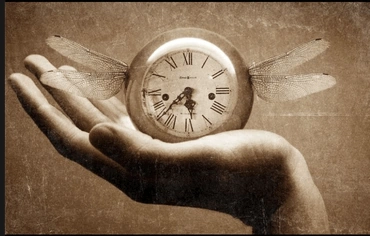
Why did God give us time?
- So that we can endeavor to do good.
- So that we can learn from our mistakes.
- So that we can have hope for a new tomorrow.
- So that we can bring goodness and cheer to life and others.
We wish each other "Happy New Year!" We think about resolutions; ways we want to do better. We want to be useful, to feel the joy that comes from fulfilling all that God has given us time for.
So... what does the Bible say about time?
In the Bible, time stands for spiritual states in our lives. Think of the 7 days of creation, the 40 days and 40 nights of rain, 20 years when Jacob worked for Laban, 7 years of plenty and 7 more of famine, or 40 years in the wilderness. There are Sabbath days, and Sabbath years, every seventh year. In the fiftieth year, there is a Jubilee; a time a resetting and restoration. The things that happened in those stories took time -- and the changes we need to make for our spiritual rebirth take time, too.
Here's a quote from Isaiah that relates to time:
"Before she has travailed she brings forth, before pain comes to her she has given birth to a male; has the land travailed in one day? shall a nation be born all at once? shall I break [open] and not generate, and cause to be generated and shut up [the womb]?" (Isaiah 66:7-9).
"Has the land travailed in one day? Shall a nation be born all at once?" Clearly not. Repentance, reformation, and rebirth are stages in a lifelong process. Here's a description of part of the process from Secrets of Heaven 2625:
"Some idea of this process can be formed from the experiences of people who are being reborn. The Lord implants the heavenly qualities of love and the spiritual qualities of faith in them not all at once but gradually. When these qualities turn our rational mind into something that is open to receiving them, we are first reborn–largely through inner struggles in which we win. When this happens, the moment is ripe for us to shed our old self and put on a new one. For more on a person's rebirth, see §§Secrets of Heaven 677, 679, 711, 848, 986, 1555, 2475."
In his work "Love in Marriage", Swedenborg offers this description, too:
"People have knowledge, intelligence, and wisdom. Knowledge has to do with being acquainted with something, intelligence has to do with understanding it, and wisdom has to do with living it. Wisdom viewed as a whole is acquaintance, understanding, and life all at once. Knowing about things comes first. It builds understanding, and these two build wisdom - which happens when you live intelligently according to the truths that you know about. So wisdom has to do with both understanding and life, together. And it becomes wisdom when it partakes of understanding and therefore is part of life, and it finally is wisdom when it is made part of life and therefore part of understanding." (Love in Marriage 130)
In the story in Genesis, where Abraham has sent a trusted servant back to his homeland to seek out a wife for his son, Isaac, there's this verse, which - though it doesn't seem so on the face of it - actually has an inner meaning that's very relevant here:
"And Isaac went out to meditate in the field toward evening, and he raised his eyes and looked, and here, now, camels coming!" (Genesis 24:63)
And here's the commentary on this verse, and the one before it, from Secrets of Heaven 3200:
"These two verses depict the condition of goodness on the rational plane when it is waiting for the truth that is to unite with it as a bride with her husband.... It is important to know, however, that these stages did not arrive just once but constantly throughout the Lord's life in the world, up until he was glorified. The same is true in people who are regenerating, because they are not reborn all at once but constantly throughout their life and even in the other life. After all, we can never become perfect."





